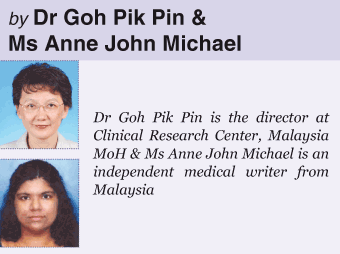Malaysia aims at 1000 clinical trials by 2020, trains professionals
17 September 2013 | Opinion | By BioSpectrum Bureau

Under the Healthcare NKEA, the entry point project entitled Clinical Research Malaysia aims to create a supportive environment and complete ecosystem to grow the number of clinical trials to 1000 by the year 2020.

The rise of the National Key Economic Areas (NKEAs) has created a sense of urgency in Malaysia. The government, in its resolve to make Malaysia a developed country by 2020, has introduced various programs to improve and enhance the nation's capacity in the fields and industries it already has an edge in. The NKEAs are not a new concept but a continuation of Malaysia's Vision 2020 to be a self-sufficient industrialized country. The NKEAs, which are part of the Economic Transformation Programme, was launched in 2010 and is the comprehensive road map to achieve the same vision albeit with updated approaches.
Under the Healthcare NKEA, 13 entry point projects (EPPs) were started. As research and development is recognized by the World Bank as an indicator for a high income nation, one of the EPPs involves making Malaysia the preferred destination for clinical research. The EPP entitled Clinical Research Malaysia aims to create a supportive environment and complete ecosystem to grow the number of clinical trials to 1000 by the year 2020. As the most important enabler for the set goal is to have trained clinicians who will be principal investigators, one of the essential tasks is to strengthen the human capacity of at least 1000 new investigators by the year 2020.
The Clinical Research Centre (CRC), a Ministry of Health (MoH) organization with the mission to improve patients' health outcomes through ethical and quality clinical research, will continue its focus of building research capacity in Malaysia by encouraging and equipping more clinician investigators. As the bulk of the healthcare services is within the Ministry of Health hospitals and clinics, CRC's role is imperative as it has within its network access to over 25,000 doctors serving in the public hospitals and health clinics.
One of CRC's recent project is organizing research camps for intelligent, highly motivated healthcare professionals who are interested in research. The objectives are to increase the number of clinician investigators in the MoH, increase the number of better quality research projects and groom the next generation of clinician scientists. In these camps, participants will be exposed to the importance of clinical research, its relevance to clinical practice and the way to integrate research into service, the link between clinical research and drug discovery, and the attributes of a good researcher. These camps, which will be held in different states throughout Malaysia, will enable participants to maintain their interest in research, share research ideas, generate solution for their research problems, connect with people with similar interest, and update their achievements in terms of protocol completion, publication and presentation and more importantly get the support they need at the network of 27 CRCs at MOH hospitals.
The first camp was held in December 2012 in Sarawak. In 2013, three more research camps were held and these were in Sabah, Johor and Penang. A Facebook page was created for participants to share and update their progress through the use of social media. The Malaysian Young Researchers page currently has 104 members.
Another initiative is the research retreats for established clinician researchers from similar discipline. As these retreats were established to brainstorm on research ideas and identify research topics for unmet clinical needs relevant to clinical practice, the head of a clinical discipline identifies established researchers and invite interested academicians from universities, and together they will recruit passionate and capable researchers to form a core research group for the discipline. This collaborative research group will initiate discussion of possible research topics by email before getting together in a research retreat for further deliberation and shortlist of research ideas and eventually preparation of summary protocols. After the retreat, the group continues with several weeks of communication via email before regrouping for meetings and to attend a workshop to complete their protocols. Currently, there are core research groups for gastroenterology, nephrology and primary care and other clinical disciplines such as ophthalmology and pharmacy will soon be formed.
In addition to these new projects, CRC offers various training programs to equip researchers with specific skills. One of its more popular courses is for Good Clinical Practice (GCP), which is a three-day workshop with a certification examination. The examination is invigilated by officers of the National Pharmaceutical Control Bureau, which is the regulatory body for clinical trials in Malaysia. The participants are taught ethics and regulatory of clinical trials, the role of ethics committees and informed consent, safety monitoring and reporting, the responsibilities of an investigator, how to work with trial sponsor, trial design and protocol development, the legal and financial aspects of clinical trials, good manufacturing practice, and safety surveillance. Candidates who pass the exam at the end of the workshop will be awarded a GCP certificate, which will then enable them to conduct clinical trials. The Ministry of Health of Malaysia has made GCP certification a requirement for principal investigators to conduct interventional trials since 1999.
Clinical Research Centre also organizes bioethics seminars for an in-depth study of clinical research regulation, the role of the ethics committees, informed consent, vulnerable subjects, the concept of equipoise, privacy and confidentiality of data, compensation, authorship and publication ethics, and disclosure of trial results. Other courses include research methodology and biostatistics, which train participants on the clinical research process, research design, study population and sampling, SPSS, descriptive analysis, and analysis of trial data. In these workshops, participants are expected to have a research idea in mind and be committed to see their research project to completion.
The recent initiatives coupled with CRC's existing training programs offer clinical researchers the entire package for career development. For a clinician with the aptitude for research and the interest to pursue it, the research camps provide them with the preliminary exposure, adequate awareness and the support network to kick-start their career. Maintaining a social media network ensures that none are lost to follow-up and the interest generated during the camp are sustained long after the camps are ended. The GCP, bioethics, and research methodology and statistics workshops equip these upcoming researchers with the skills they need to conduct good quality and ethical clinical research. Lastly, the research retreats target established researchers. These retreats are devised to challenge these experienced researchers to formulate research that is relevant and impacts their current clinical practice.












